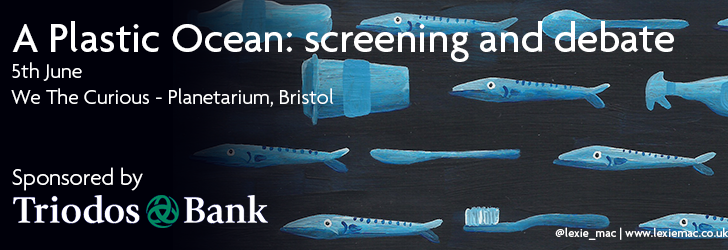Plastics in the oceans is the most-talked-about environmental issue of 2018. Progress appears to be being made, with the 5p charge on plastic bags and a proposed ban on plastic straws. But do these neat, plausible and easy solutions match up to the scale of the problem? Are alternatives to plastic likely to cause their own environmental problems in the future?
This year, in support of the World Environment Day #BeatPlasticPollution campaign, the IES are hosting a series of film screenings showing the documentary, A Plastic Ocean. Each screening will be followed by a panel debate. On three consecutive nights – in Bristol, London and Edinburgh – we will be debating the science behind the headlines and discussing potential solutions, engaging people in a conversation to rethink plastic.
Our panellists
- Jo Ruxton, Co-Founder of Plastic Oceans Foundation
- Natalie Fee, Founder of City to Sea
- Stacey Fordham, Co-Founder of Zero Green
- Susan Jay, Programme Area Manager, Wales Sustainable Resource Management Programme, (WRAP Cymru)
The Plastic Oceans Foundation is working to change the way we deal with plastic waste by challenging society’s perception that this indestructible substance can be treated as ‘disposable’. The team behind the documentary set off on what would be a four-year global odyssey to explore the issue of plastics in our oceans and its effect on marine ecosystems and human health. A Plastic Ocean documents how plastics, once they enter the oceans, break up into small particulates know as micro-plastics that then enter the food chain. These particles attract toxins which are stored in seafood’s fatty tissues and are eventually consumed by humans.
The problem of plastic pollution is growing exponentially, with expert scientists estimating around eight million tonnes of plastic makes its way into the ocean each year, posing a serious threat to our natural and marine environments. With microplastics recently being reported in Arctic sea ice it is clear this is a global environmental issue. Without urgent action both the quantity and associated impacts will increase.
19:00 Film screening
20:50 Panel discussion
21:30 Event close
Cost
Non-members receive a free IES affiliate membership with every booking.
| Standard | £12 |
| Student* | £9 |
| IES Member (any grade) | Free |
*A valid student ID will be requested on arrival at this event


